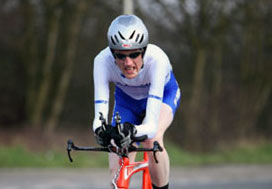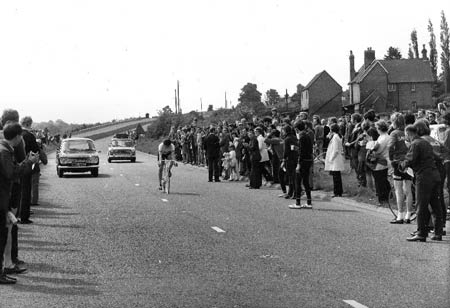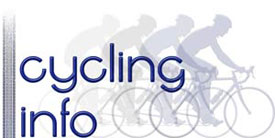 Some of my good friends run a specialist running shop in London ‘Run and Become‘. (A very good place to get a pair of running shoes if you like a bit of running). They run a few ‘inspirational’ evenings to give informal workshops on running, fitness and related topics. They have invited me to go along and speak at a session in a couple of weeks on ‘pushing the limits‘ – getting the most out of yourself. – How to train, how to transcend yourself and how to push your own limits. The session is free and on Tues, December 6th, 42 Palmer Street, London. More details, if you want to come along.
Some of my good friends run a specialist running shop in London ‘Run and Become‘. (A very good place to get a pair of running shoes if you like a bit of running). They run a few ‘inspirational’ evenings to give informal workshops on running, fitness and related topics. They have invited me to go along and speak at a session in a couple of weeks on ‘pushing the limits‘ – getting the most out of yourself. – How to train, how to transcend yourself and how to push your own limits. The session is free and on Tues, December 6th, 42 Palmer Street, London. More details, if you want to come along.
In a way, I find the ‘mental’ aspect of cycling as fascinating as the physical side. To help prepare what I might say, I’ve jotted a few ideas down to give myself some structure on this topic of ‘pushing the limits.’
Why?
Why? is the question everyone wants to ask you, but it’s often difficult to answer. Why do something that is so obviously painful?
Racing is painful. It is painful physically, painful mentally. But, then there is another part of us that really loves it. This is the fascinating thing – how something can be both painful and joyful at the same time.
I think fundamentally, I’m drawn to cycling because I enjoy it. ‘Enjoy’ seems an inadequate word. Perhaps better phrases would be ‘satisfaction’ ‘a sense of personal achievement’. I also feel that, there is some part of me, which really wants to push the lethargic self out of my comfort zone. This is a little difficult to articulate, but it’s the sense that if you just stay in your comfort zone, you stagnate. If you seek to strive for something new, something you’ve never experienced before – then you get a more vivid, dynamic sense of happiness.
How?
There is the training, the diet, the right equipment – you can find a ton of advice on these aspects of cycling. But, the other aspect is something much more difficult to coach. It is our motivation, our own determination, the attitude we have to both racing and training – even the thoughts that go through our mind when cycling. To get the most out of ourselves and really transcend our previous capacities, I try to do the following:
- Happiness. I try to be happy and positive about cycling. It may sound a little trite, but I feel that it does make a big difference. Just little things can help, I try to smile to myself before racing. It releases some good energy – a reminder to relax, to get in the flow, don’t take the result so seriously, remember why you are doing it.
- Conscious Awareness. When you’re racing it is quite easy to ‘drift off a little’ you just get into a rhythm where your mind starts wandering, and you inevitably waste some energy and inspiration. Being consciously aware of what you are doing, being completely focused and aware, creates tremendous concentration and focused energy.
- Avoid Negative Preconceptions. Again it sounds a little obvious – any self-help book can tell you to ‘avoid negative thinking’ The difficulty is actually implementing it, and also being aware of those underlying currents of thought we might not even be aware of. One example, I like to share. When I was 16, I came last in a cross country race at school. I retired from running and blamed bad genes (my parents aren’t athletes) and never really raced again for another 10 years. What’s the point of racing when you think you have bad genes for sport? 10 years later, when I got into racing, I repeatedly surprised myself, and, of course, now I wish I hadn’t waited until I was 26 to take up cycle racing.
What’s the Aim of Pushing the Limits?
There is the very human element of wanting to do a personal best, then you want to win, then you want to be national champion, then world champion e.t.c.
But, that isn’t the overriding factor, it isn’t why I started cycling and racing. It was more to see what I could do. To learn from doing something different.
There’s also the idea that by pushing your physical limits you can become aware / bring to the fore other parts of your being – more than just the body. My teacher, Sri Chinmoy frequently writes about the concept of the soul (the highest part of ourselves). It is the soul that sustains the body, Whatever you might call it, it’s that part of you which is beyond the body. When you really try to ‘dig deep’ in a physical sense, I think ‘we also are digging deeper’ in a mental / spiritual sense – even if we’re not consciously aware of it. Again there is this idea that by getting well out of your comfort zone, you make progress.

(btw: I was very interested to read about the great time triallist, Alf Engers, who said when he broke competition record for 25 miles in 1978 – riding 49m 24s, he had an out of the body experience and felt he was in a state of grace for the last part of the race. Hilton, T. (2004), One More Kilometre And We’re In the Showers, London: Harper, p. 349)
What Limits do you want to Push?
When I think of transcending my limits, the first thing that springs to mind is a hill climb like ‘Nick ‘o Pendle’ 3 minutes of pushing yourself into oxygen debt, pushing yourself so hard, every fibre of your body is screaming to slow down. It’s the fight against gravity, the excitement of being on the edge. The vividness of life when you’re acutely doing something very challenging.
But, it’s more than that.
- There are the long distance time trials 100 miles and more. I’ve only ever done three 100 mile time trials, but I know I want to do a lot more. At some time, I would like to move up to 12 hour and 24 hour time trials, to gain a wider perspective on endurance efforts.
- There is also the sense of wanting to improve your whole attitude to cycling. It’s not just about winning races and setting personal bests. There is also the challenge to be happy on training rides, to be detached when people throws bananas at you from a car window (no, it’s never happened that people throw bananas, but I have been ‘shot at’ with a cap gun

- Overcome challenges of age.
- Learning to listen to body and working to overcome pains and niggles rather than give up.
One thing about ‘pushing the limits’ is you never feel boredom. When you hear young people say they are bored, it would be great if they could be motivated to go out and try and push their own limits in some way.
Other Speakers at Event
- Abichal Watkins – 7 times entrant to the 3100 mile Self-Transcendence Race (that’s running 3100 miles in 50 days around a concrete block in New York)
- Tarit Stott – former 24 hour national champion
Other Ideas
Any More Tips / Thoughts on pushing the limits which you feel is helpful?
Related
- Pushing the Limits at Run and Become

Here’s wishing you well for this talk.
I agree with Lynn, this blog post is particularly interesting and thought provoking.
I wonder if the nature-v-nurture question applies in this topic? We can train or be trained in a sport by a coach, who will draw the best out by teaching the right techniques, maximising motivation and so on. With the mental approach being so critical, does that depend on our own personality alone or can a be coached as well? I’d be interested in what you think on that. Myself, I know we can coach ourselves to think / react differently but our basic personality is still there underneath….
Doug, interesting question.
I think you can be given coaching, teachings on the mental approach. But, only you can implement it.
It is probably easier for a coach to work on physical side than mental side. But, both are important.
I also think you can change your approach to sport. If you have a negative attitude now, there’s no reason why you can’t change that to a positive one – whatever your personality.
Hi Tejvan, Your blogs are great and this one in particular is interesting and inspirational. I believe that at least 50% of our performance in sport is directly effected by our mental out look. It’s surprising what our head ‘can’t do’ and yet ‘can do’ when we change the angle in which we view ourselves, our sport, what others may think etc…
It’s exceptionally difficult to be race fit when the mind is not.
thanks Lynn